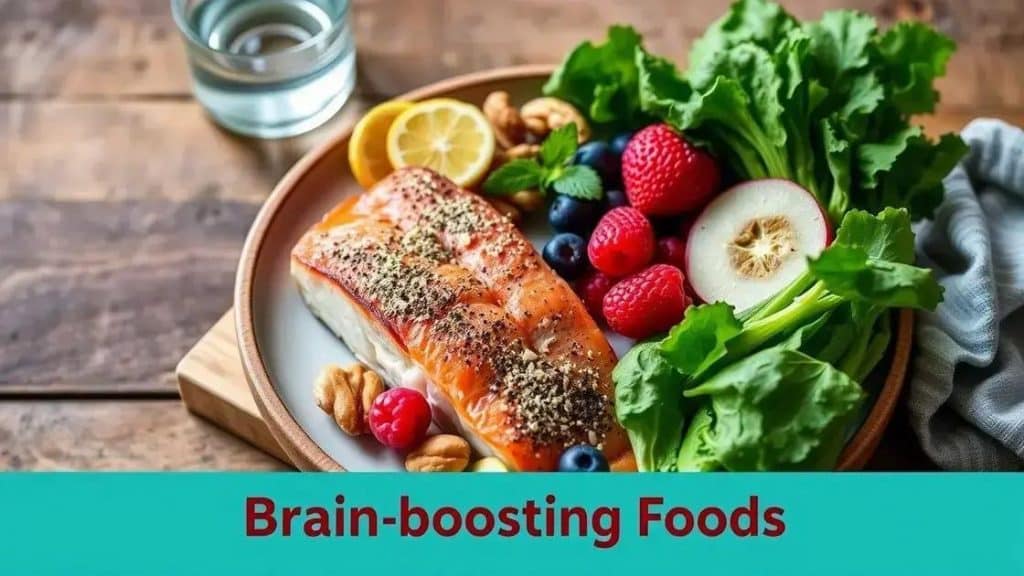nutrition research for mental health: the surprising link

Nutrition research for mental health highlights how a balanced diet rich in whole foods, essential nutrients, and hydration can significantly enhance mood and cognitive function while reducing the risk of mental health disorders.
Nutrition research for mental health reveals intriguing insights into how the foods we eat influence our emotional well-being. Have you ever wondered why certain meals lift your spirits or calm your anxiety? Let’s dive into this fascinating connection.
understanding the role of nutrition in mental health
Understanding the role of nutrition in mental health is essential. Our diet does not just affect our physical health; it plays a significant part in how we feel and think. Healthy eating can lead to improved mood and cognitive function.
How Nutrition Affects Mental Well-Being
Many studies show that nutritional choices directly influence mental health. For instance, diets rich in fruits, vegetables, and whole grains can enhance mood and decrease feelings of anxiety.
Key Nutrients for Emotional Balance
Certain nutrients have proven to be vital for maintaining mental stability:
- Omega-3 fatty acids: Found in fish and nuts, these fats support brain health and help reduce depression.
- B vitamins: Essential for energy levels, B vitamins like B6, B12, and folate play a role in mood regulation.
- Antioxidants: Foods high in antioxidants, such as berries and leafy greens, can protect the brain from oxidative stress.
Additionally, consuming a balanced diet can improve brain function, enhancing memory and concentration. On the contrary, poor diet choices can lead to issues like fatigue and irritability, impacting mental health negatively.
Moreover, hydration is crucial. Dehydration can lead to diminished cognitive performance and mood swings. Drinking enough water throughout the day can help optimize both mental and physical well-being.
Practical Tips for a Healthy Diet
Making small changes in your diet can have a big impact on mental health. Here are some practical tips:
- Include variety: Ensure your meals contain a wide range of nutrients.
- Limit processed foods: These often lack essential nutrients and can negatively affect mood.
- Plan meals: Having a meal plan helps in making healthier food choices.
By prioritizing a nutritious diet, you can support your brain’s health and enhance your emotional well-being, creating a more balanced life overall.
key nutrients that affect mood and cognition

Key nutrients play a vital role in influencing mood and cognition. Consuming the right foods can enhance mental clarity and overall emotional well-being. Understanding these nutrients helps individuals make healthier choices.
Essential Nutrients for Mood Improvement
Some nutrients are particularly beneficial for improving mood and cognitive function:
- Serotonin-boosting foods: Foods rich in tryptophan, like turkey and bananas, can aid in serotonin production, a neurotransmitter linked to happiness.
- Magnesium: This mineral helps regulate neurotransmitters. Spinach, nuts, and whole grains are good sources.
- Vitamin D: Often associated with mood regulation, vitamin D can be obtained from sunlight and foods like fatty fish.
Additionally, consuming enough omega-3 fatty acids is crucial for brain health. These can be found in salmon, walnuts, and flaxseeds. Studies have shown that omega-3s can decrease symptoms of depression and anxiety.
Role of Antioxidants
Antioxidants also hold significance for cognitive health. They protect the brain from oxidative stress. Foods high in antioxidants, such as berries, cocoa, and green tea, help support overall brain function.
A balanced diet that incorporates these key nutrients can significantly boost mood and cognitive abilities. By prioritizing these foods, individuals can enhance their mental health.
Another important aspect is hydration; drinking enough water is essential for maintaining focus and clarity. Dehydration can lead to fatigue and cognitive decline.
Incorporating Nutrients into Your Diet
Incorporating these nutrients into daily meals can be simple. Here are some tips:
- Mix fruits and vegetables: Aim for a colorful plate which indicates a variety of nutrients.
- Snack on nuts: Nuts are a convenient source of magnesium and healthy fats.
- Consider supplements: If necessary, supplements for vitamin D and omega-3s can be beneficial.
By focusing on these nutrients, individuals can actively contribute to better mood regulation and improved cognitive function.
the impact of diet on mental health disorders
The impact of diet on mental health disorders is a growing area of interest. Research shows that what we eat influences not just our physical health but also how we feel mentally.
Dietary Patterns Linked to Mental Health Issues
Different dietary patterns can either exacerbate or alleviate mental health issues. For instance, diets high in processed foods and sugars may increase the risk of depression and anxiety. On the other hand, a balanced diet rich in whole foods can promote better mental health outcomes.
Foods to Avoid for Better Mental Health
Here are some food types that may negatively impact mental health:
- Refined sugars: These can lead to spikes and crashes in energy levels, affecting mood stability.
- Trans fats: Found in many processed foods, these fats are linked to inflammation and mental health issues.
- Alcohol: While it may seem relaxing, excessive alcohol consumption can worsen symptoms of anxiety and depression.
Moreover, new studies show that individuals with mental health disorders often have deficiencies in important nutrients. This suggests that improving the diet could potentially support mental health treatment.
Positive Dietary Changes for Mental Health
Incorporating more nutrient-dense foods into your diet can have positive effects. For example, leafy greens, fatty fish, and whole grains are known to support brain function.
Additionally, being mindful of food choices can improve overall mood. Foods rich in vitamin B and omega-3 fatty acids can be particularly helpful in managing mental health disorders. Ensuring adequate intake of these nutrients might support treatment and improve outcomes.
As studies continue to unfold, it is increasingly clear that a healthy diet can contribute to mental well-being. By focusing on balanced meals and reducing processed food intake, individuals may experience positive shifts in their mental health.
practical tips for a mentally healthy diet

Practical tips for a mentally healthy diet can make a significant difference in your overall well-being. Eating the right foods not only nourishes the body but also supports mental health.
Focus on Whole Foods
Incorporating whole foods into your meals is essential. These foods are often high in nutrients that benefit your brain. Examples include:
- Fruits and vegetables: Aim for a variety of colors each day; they are rich in vitamins and minerals.
- Whole grains: Foods like brown rice and oats provide fiber and stable energy.
- Lean proteins: Include sources like chicken, fish, beans, and nuts for muscle maintenance and brain function.
Along with whole foods, staying hydrated is crucial for mental clarity. The brain is around 75% water, so consuming enough fluids helps maintain focus and cognitive performance.
Mindful Eating Practices
Adopting mindful eating practices can enhance the experience of meals. Paying attention to hunger and fullness signals is key. Try to:
- Eat slowly: Take time to savor each bite, which aids digestion and satisfaction.
- Limit distractions: Turn off screens while eating to focus more on your food.
- Plan meals: Organizing meals in advance helps ensure a balanced diet with less impulse eating.
Replacing unhealthy snacks with nutritious options can also improve your diet. Choose foods like nuts, yogurt, or fresh fruits instead of chips or sweets. This small change can enhance mood and energy levels.
Consider Supplements if Needed
Sometimes, even with a healthy diet, individuals might have nutritional gaps. Consulting a healthcare provider about supplements, like vitamin D or omega-3 fatty acids, can be beneficial. These nutrients have been linked to better mood regulation.
In addition, creating a balanced meal plan that emphasizes these tips can lead to long-lasting improvements in mental health. By focusing on nourishing your body and mind, you build resilience against stress and anxiety.
In conclusion, maintaining a healthy diet is crucial for mental well-being. By focusing on whole foods, practicing mindful eating, and considering essential nutrients, you can enhance your mood and cognitive functions. Remember to stay hydrated and make small changes to your eating habits for significant improvements. Nourishing your body with the right foods helps build resilience against stress and promotes a more positive mindset.
\n\n\n
\n
\n
FAQ – Frequently Asked Questions about Nutrition and Mental Health
How does diet impact mental health?
A balanced diet rich in whole foods can improve mood and cognitive function, while processed foods may contribute to mental health issues.
What are some key nutrients for mental well-being?
Key nutrients include omega-3 fatty acids, B vitamins, and antioxidants, which support brain health and mood regulation.
Can hydration affect mental clarity?
Yes, proper hydration is vital for maintaining focus and cognitive performance; dehydration can lead to fatigue and confusion.
What are practical tips for a mentally healthy diet?
Focus on whole foods, practice mindful eating, stay hydrated, and consider including essential nutrients in your meals.





